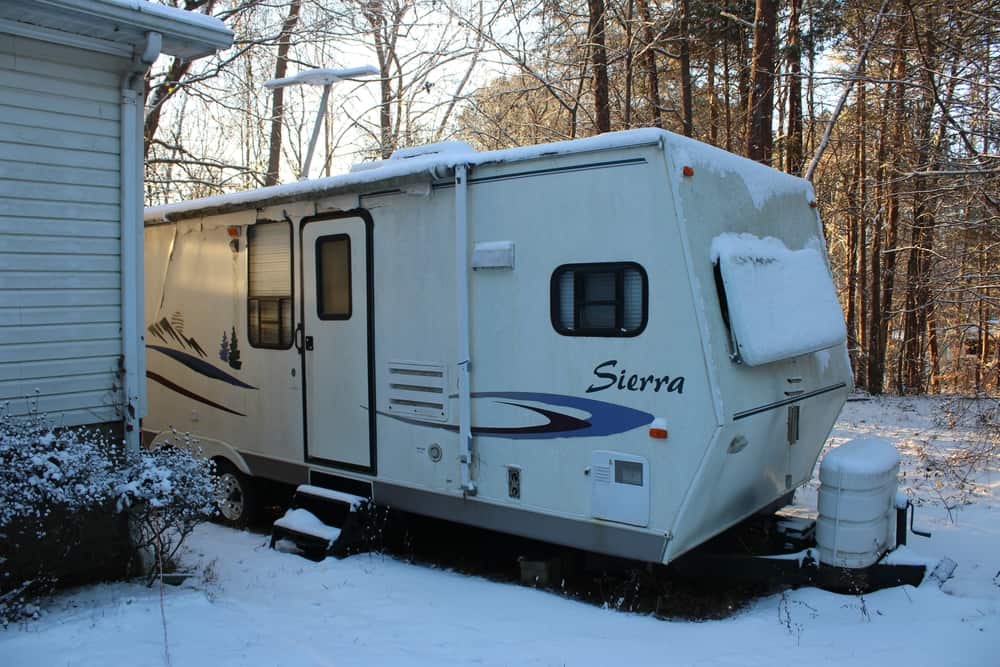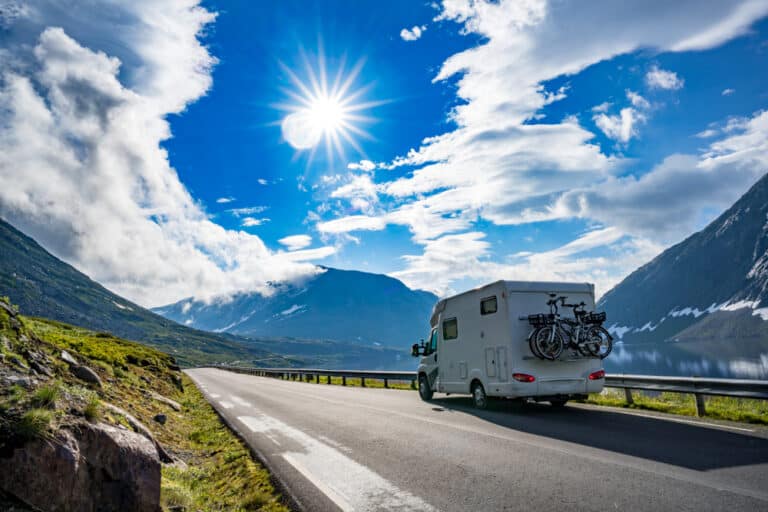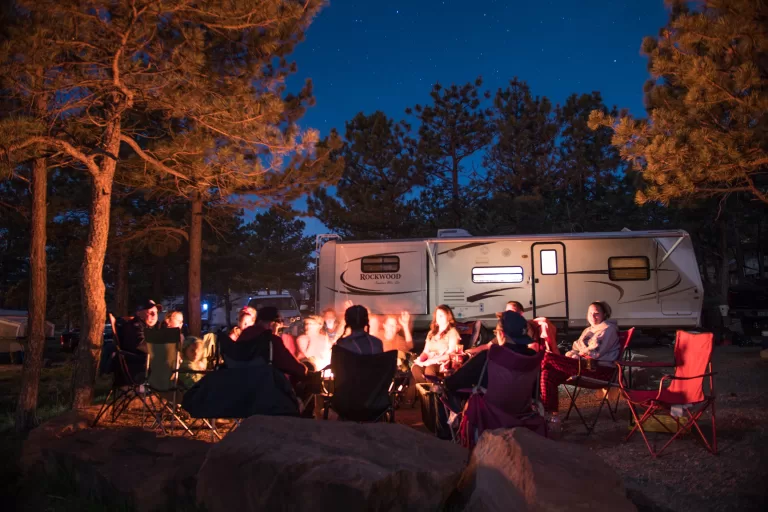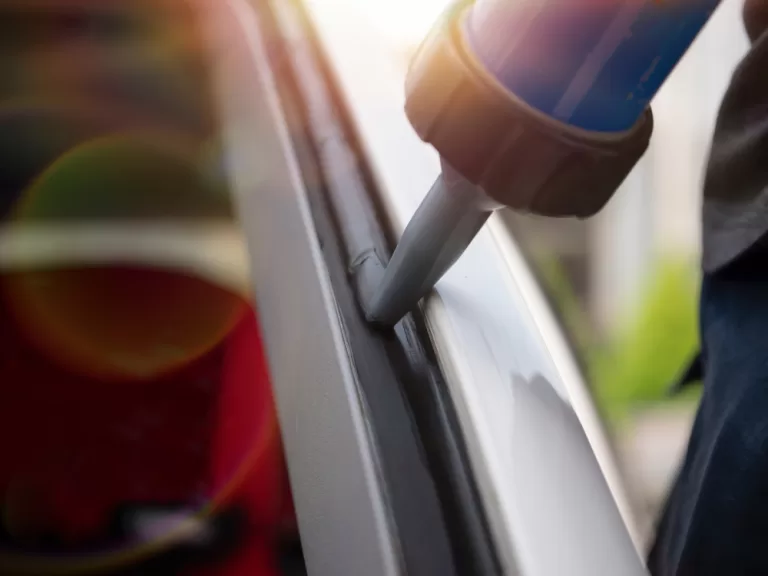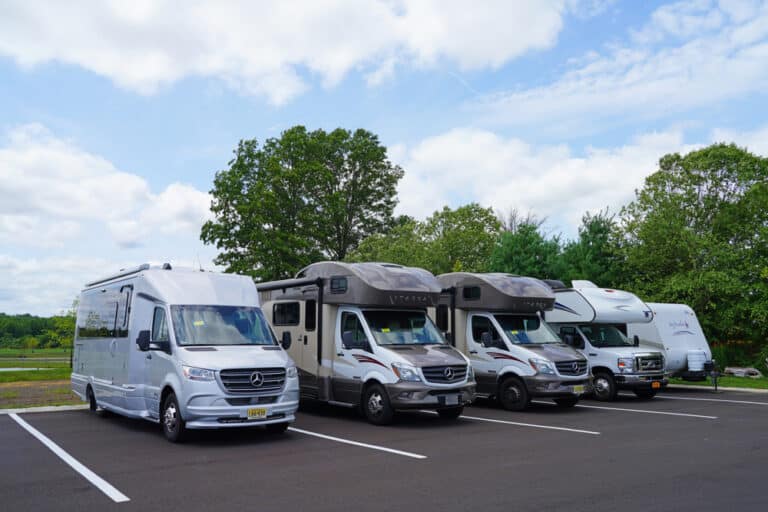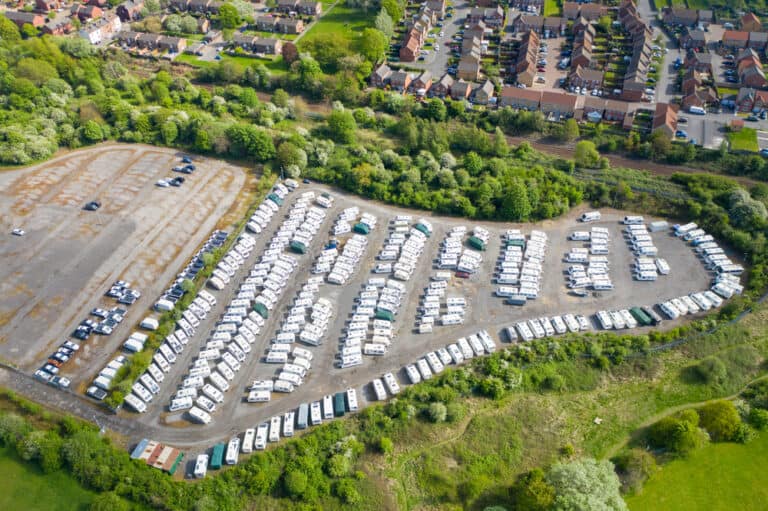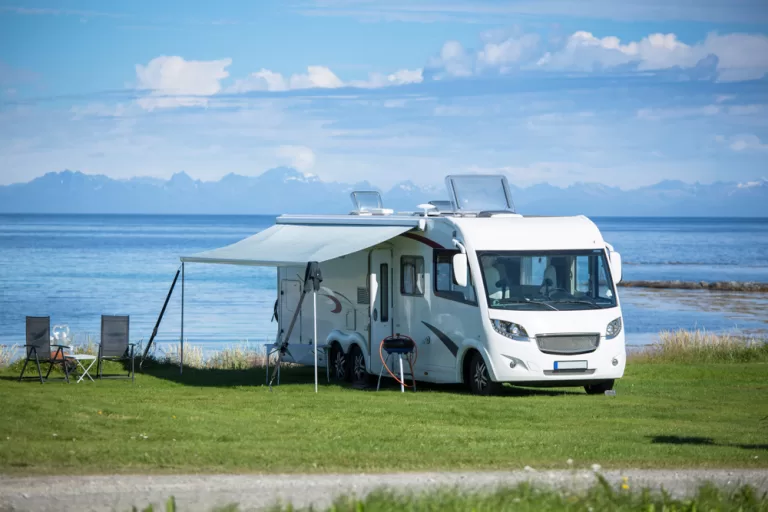How Not Using RV Antifreeze Can Lead to a Horror Story: 5 Best Products and How-To Guide
Winterizing your RV, camper or travel trailer is not just an optional task, it is a necessary step in maintaining the longevity of your vehicle. RV Antifreeze is essential. Failure to winterize your camper will result in serious damages and costly repairs. It did for me. I didn’t winterize my RV one year because I was in a rush to store it away for the winter. I figured I could just deal with it when I took it out of storage in the spring. Unfortunately, when I returned to my RV in the spring, I was in for a nasty surprise.
As I started to prepare my RV for my first camping trip of the year, I turned on the water pump to fill the water tank. Suddenly, I heard a loud pop followed by the sound of rushing water. I quickly ran to the bathroom to see what was happening and found that the toilet had burst, flooding my RV with water.
I was devastated. I had forgotten to winterize my RV and now it was ruined. I called a professional RV repair company, and they told me that the damage was extensive and would cost me thousands of dollars to repair. I learned the hard way that winterizing my camper was not an optional task. The consequences of failing to winterize my RV was disastrous. Here are only some of the things that happened because I didn’t winterize:
- Frozen Pipes: When the water in in my RV’s pipes froze, it expanded and caused the pipes to burst. This resulted in extensive damage to my RV’s plumbing, including water damage to the interior.
- Damaged Water Heater: I didn’t winterize and didn’t drain the water from the water heater, so the water inside froze and expanded, causing the water heater to crack.
- Cracked Toilet: Water left in the toilet bowl and P-trap froze, causing the porcelain to crack. This left me with costly repairs to the entire toilet.
- Mold and Mildew: When water was left inside, it created an environment that is ideal for mold and mildew growth. This made my RV have a lot of unpleasant smells.
The Best Options for RV Antifreeze on the Market
When it comes to winterizing your RV, using a good quality antifreeze is essential. Antifreeze helps to protect your RV’s plumbing and other components from freezing during the winter months. Here are five of the best RV antifreeze products available:
1.Best Overall: RecPro Non-Toxic RV Antifreeze
RecPro Non-Toxic RV Antifreeze
I absolutely love this RV antifreeze, it’s my favorite! It’s an excellent product that worked wonders for our camper during the winter. The ease of use and visibility made it a breeze to take care of our drains. It’s not only safe for drinking water systems when preparing for winter storage, but it’s also suitable for pools, boats, RVs, and mobile homes. What’s more, it’s made from materials that the FDA considers non-toxic, providing peace of mind. Additionally, it won’t cause any harm to steel, plastic, copper, or brass plumbing. With its superior protection compared to simply “air blowing” lines, it ensures the safety and longevity of your vehicle’s system.
2.Best Budget Option: P-restone Original AF225 RV/Marine Antifreeze
p-Restone Original
This is the most affordable option compared to others, this antifreeze provides unparalleled performance even in extreme cold weather conditions reaching as low as -100°F, with a No Burst Guarantee. It is perfectly safe for use in RVs, travel trailers, pools, boats, and seasonal homes. The antifreeze offers superior protection against damage, corrosion, and rust, ensuring the longevity of metals, plastic, rubber, and elastomers commonly found in potable water systems. However, it should be noted that this product is not intended for use as a winterizing fluid or antifreeze and coolant in gas or diesel engines.
3. CPDI Champion RV and Marine Antifreeze
CPDI Champion Antifreeze
This is specially formulated to provide exceptional protection for your RV’s plumbing, pipes, and filters during the winter season. With its concentrated formula, it offers reliable burst protection down to -50°F, ensuring that you can safeguard your RV from potential damage and costly repairs. This convenient antifreeze requires no mixing or diluting. The antifreeze is safe and effective on a wide range of materials commonly found in RVs, such as brass, copper, and plastics (excluding acetate). It’s also fairly inexpensive compared to other options.
4.RecPro RV Boiler Antifreeze
RecPro RV Antifreeze
This is a reliable and high-performance solution for your RV’s heating system. This antifreeze is based on Propylene Glycol, ensuring non-corrosive properties that will not cause any damage to your heating systems. It offers excellent protection against freezing temperatures and has a high boiling point, guaranteeing optimal performance in extreme conditions. The yellow color provides easy visibility, allowing for quick identification and monitoring. What’s more, this antifreeze does not require dilution, making it convenient and ready to use. It is non-toxic, ensuring the safety of your RV.
5.RV & Marine Splash 619526 RV/Marine Antifreeze
RV & Marine Splash Antifreeze
This antifreeze offers reliable burst protection down to -50 degrees Fahrenheit, ensuring your systems are safeguarded during freezing temperatures. This antifreeze provides a convenient and ready-to-use solution, eliminating the need for any additional mixing or dilution. What sets it apart is its proprietary plant-derived additive, which enhances user safety compared to ethylene glycol-based alternatives. It is safe for incidental contact with people, pets, and wildlife, and is readily biodegradable while being non-toxic to aquatic life. With its universal fit type, the RecPro RV Antifreeze offers a reliable and eco-friendly option for your various needs.
Step By Step Guide to Winterization

1. Empty the Plumbing System
Before starting the winterization process, it’s crucial to remove all water from your vehicle’s plumbing system. This includes draining the freshwater tank, water heater tank, and waste tanks. Make sure to open all faucets and showers to guarantee any remaining water is drained out.
2. Install a Water Heater Bypass Valve
To prevent unnecessary use of antifreeze, set up a water heater bypass valve if your RV or camper doesn’t already have one. The bypass valve allows you to avoid the water heater when adding antifreeze to the plumbing, eliminating the need to fill the hot water heater with antifreeze.
3. Introduce Antifreeze into the Plumbing System
Using either propylene glycol or ethylene glycol antifreeze, add the required amount to your RV’s plumbing system based on the manufacturer’s instructions. You can use a pump antifreeze system or an antifreeze inlet to incorporate the antifreeze into the system efficiently.
4. Distribute Antifreeze Across All Fixtures
Activate each faucet, shower, and toilet in your RV or camper until the antifreeze flows through them. This step ensures that the entire system is protected from freezing temperatures during winter storage.
5. Seal Vents and Openings
To avoid drafts and keep pests out, close off any vents or openings in your RV or camper. Utilize vent covers, expandable foam, or steel wool to block any gaps or holes.
6. Safely Store Batteries
Unplug and remove your RV or camper’s batteries, keeping them in a cool, dry place throughout the winter. This practice helps extend their lifespan and guarantees they’ll be ready for use when you de-winterize your vehicle.
7. Inspect Antifreeze Expiration Dates
Antifreeze may lose its effectiveness over time. Make sure to examine the expiration date on your antifreeze containers and replace any expired products before using them in your RV, camper, or travel trailer.
By following these steps and using an air compressor to blow out any remaining water from the plumbing, you can effectively winterize your RV, camper, or travel trailer. Additionally, remember to open the low point drains to ensure all water is removed from the system. Proper winterization will help guarantee that your vehicle remains in excellent condition and is ready for use when the camping season returns.
Products to Help Winterize Your RV, Camper or Travel Trailer
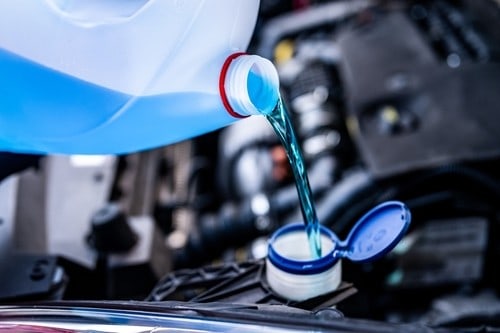
To make the winterization process easier, here are some products that you may need:
- RV Antifreeze: You can find RV antifreeze at most hardware or camping supply stores. Look for antifreeze that is specifically designed for RVs and potable water systems.
- Water Pump Converter Kit: This kit allows you to connect a hose to the inlet side of your water pump, making it easy to add RV antifreeze to your water system.
- Blow Out Plug: This plug connects to the city water inlet on your RV, allowing you to use compressed air to blow out any remaining water in your water lines.
- Sealant: Use a high-quality sealant to seal all openings in your RV, camper or travel trailer.
- P-Traps: P-traps are designed to prevent sewer gases from entering your RV, camper or travel trailer. Make sure to protect them with antifreeze to prevent them from freezing.
- Water Heater Bypass Kit: This kit allows you to bypass your water heater when adding RV antifreeze to your water system.
Understanding RV Antifreeze

There are two main types of antifreeze used in winterizing your RV or camper: propylene glycol antifreeze and ethylene glycol antifreeze. Both of these products serve the same purpose – preventing your RV’s water system from freezing during cold winter months. However, there are some differences between the two that you should be aware of when choosing the right product for your vehicle.
Propylene Glycol Antifreeze
Propylene glycol antifreeze is a non-toxic, biodegradable option that is safe for use in RVs and campers. It is less harmful to the environment and is generally considered safer for pets and humans if accidentally ingested. When shopping for antifreeze, look for products specifically labeled as “RV antifreeze” or “antifreeze for RV” to ensure you’re purchasing a propylene glycol-based product.
Ethylene Glycol Antifreeze
Ethylene glycol antifreeze is a more traditional type of antifreeze commonly found in automotive applications. While it works effectively to prevent freezing, it is toxic if ingested and can be harmful to the environment. If you choose to use an ethylene glycol-based antifreeze, be sure to select a product labeled as “antifreeze with ethylene glycol” or “antifreeze ethylene glycol.”
Conclusion

In addition to using the right antifreeze products, it’s crucial to follow proper winterization steps, such as draining the water system, bypassing the water heater, and sealing off vents and openings. Make sure to also store your batteries properly and check the expiration date on your antifreeze containers. By taking these steps and investing in quality RV antifreeze products, you can help protect your vehicle’s fresh water tank and hot water tank, drain plug, and other components from freezing temperatures. With proper winterization, you can rest easy knowing that your RV, camper, or travel trailer will be in excellent condition when it’s time to hit the road again.
PLEASE NOTE: I participate in the Amazon affiliate program, which provides a means for me to earn a small commission by linking to products there. My opinions are my own and I only link to products I can recommend to friends and family with total confidence. Using these links won’t cost you an extra dime!
Looking for some more helpful product guides? Check out my other blog posts.

